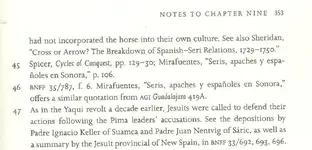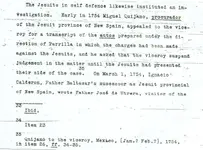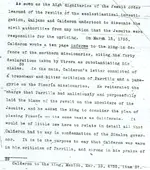Good morning Lamar, Joe etc.
OK Gentlemen:It is time to clarify a few things. All of us are correct, but for different reasons.
A) The mission priests were living in a very harsh environment and period. It was very Dangerous and they were isolated.
They had early learned, that left to themselves, most people do not get up early and go to work without an incentive, most of the time it was not a constant drive to work for nothing for the Lord in the form of the Missionary and his plans.
Having seen Naval type discipline, which was fairly common in those days, while coming to the new world, they quickly realized that if left to themselves, the sailors would not do what is necessary to keep a ship safe and efficient. So Naval discipline was developed, one where a man could be lashed for what is considered silent contempt. No disrespect to an officer - Missionary - could be allowed if the ship was to successfully operate.
When they finally found themselves isolated and attempting to build up a self supporting mission and flock, they quickly found that the Indians had no drive to voluntarily work hard and give up their girlies and booze. A devout 'please' simply did not work very efficiently.
So they resorted to ship board discipline, and it worked, but it also gradually built up resentment , such as shipboard Mutiny. No resistance to the Padres was allowable in order to keep the mission running efficiently and safely.
Periodically there would arise arses, such as Sponge, gully, and myself that would finally lead to open revolt.
They were dedicated men, working under the harsh realities of the wild frontier, they neither had the time, nor the training in general for mining. THAT was left for another group of Jesuits. Obviously a limited no. did develop churches, some of magnificence, but genereally in built up centers and by other higher ranking Priests.
The mission Jesuits in general, were expendable, they were sacrificed to hide prior knowledge of the expulsion order.
~~~~~~~~~~~~~~~~
B) Now about the mining, yes, it definitely did take place, even back in the old world they owned and operated mines.
When they came to the new world, they were acutely aware of Gold and silver mines in abundance and with no effective competition. they supplied the mining Eng's for many of the larger mines around Mexico city, Guadalajara, etc. They taught mining in their schools.
Rome had long ago found that power and security lay in lavish gifts - bribes - When the richness of the new world became evident, what was more normal than to start reaping the bountiful harvest that the lord had provided, they mined!
For this they used the coadjuntor to mainain a low key. for reasons best known to them selves in that period they were kept apart. As a result, the coadjuntors were not subject to the Expulsion order.
The coadjuntors often supplied gifts of gold, Silver, etc., to the mission priests with out their openly acknowledging that they were both of the same party. To all appearances the were just miners.
However this was most probably known to the king, since he had his own espeonage sytem, so when the expulsion order came, the coajuntors also stopped mining.
The coadjuntors were the ones working at Tayopa, although some openly frocked priests were there, presumably to handle the spiritual needs of the faithful.. I assume that the actual head was a Priest. They were responsible for the founding and maintaining the system of leap frog missions across Northern Mexico.
~~~~~~~~~~~~~~~~~
So, yes the mission priest was a dedicated, hard working, individual, but He was only a 'small percentage' of the Jesuit Society personel..
The Society was a kingdom in it's own right, one which was well versed in the rules of self preservation, one that easily,and with a clear conscience, attempted to wrest the new world a way from Spain to accend to even higher heights of power. It was to commence with North America, for which Tayopa was destined to provide the financing. ©@
Don Jose de La Mancha (Tropical Tramp)





 In note 47, she is giving you a source to see what the Jesuit's had to say in their own defense.
In note 47, she is giving you a source to see what the Jesuit's had to say in their own defense.



 The accumulated family wealth which they freely gave up in Europe would have certainly been more that they could ever have wrested from the stubborn rocks of the New World colonies.
The accumulated family wealth which they freely gave up in Europe would have certainly been more that they could ever have wrested from the stubborn rocks of the New World colonies.